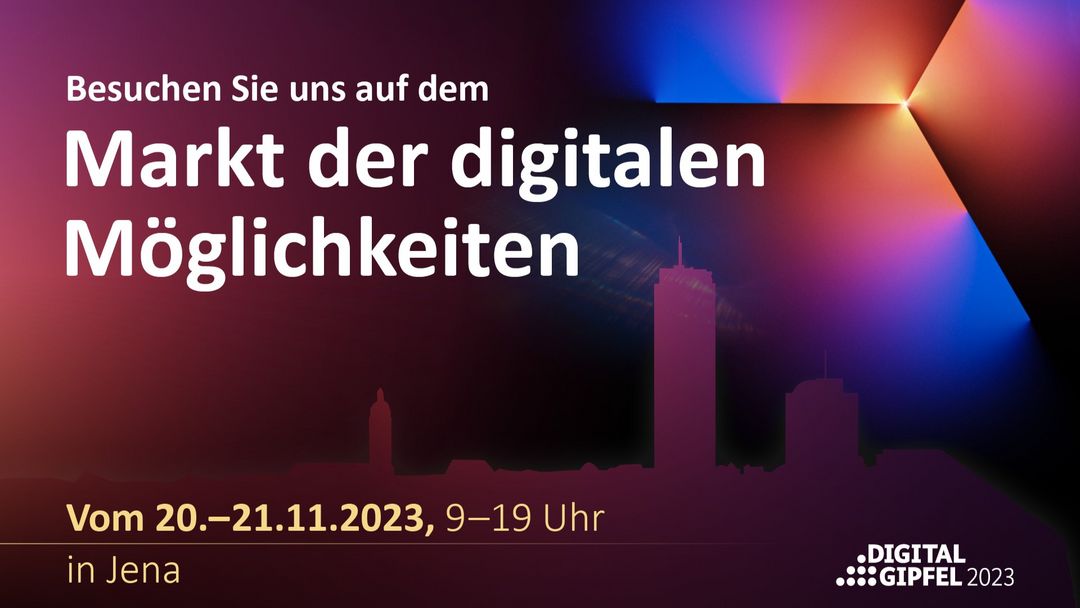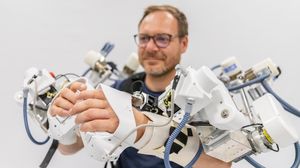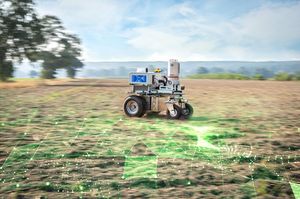
Digital Summit 2023: DFKI showcases robot-assisted rehabilitation and a virtual breeding garden at the Market of Digital Possibilities
| Health & Medicine | Farming & Agricultural Technology | Human-Machine Interaction | Robotics | Virtual & Augmented Reality | Cognitive Assistants | Cooperative and Autonomous Systems | Robotics Innovation Center | Speech and Language Technology | Saarbrücken | Bremen | Berlin | Osnabrück / Oldenburg

Within the Digital Summit, the city of Jena and the state of Thuringia are hosting the Market of Digital Possibilities – an exhibition showcasing various areas where digital technology is already in use today and will play a significant role in the near future. The event will take place at five different locations in Jena and will be open to visitors on Monday and Tuesday from 9 am to 7 pm.

The Robotics Innovation Center will demonstrate a robotic exoskeleton at the Market of Digital Possibilities at Friedrich Schiller University Jena, Carl-Zeiss-Strasse 3. The exoskeleton was developed in the Recupera REHA project, funded by the Federal Ministry of Education and Research (BMBF), for the upper body rehabilitation following a stroke and further enhanced in several projects supported by the Federal Ministry for Economic Affairs and Climate Action (BMWK). Current research questions regarding the use of AI methods are addressed in projects funded by the BMWK, in collaboration with the University of Duisburg-Essen, and the BMBF. At their exhibition stand, DFKI researchers demonstrate three different therapy modes. The Teach-in mode allows movements to be trained into the system by simply guiding the exoskeleton arm, which can then precisely replicate those movements. In the Mirror mode, the movement of the healthy arm is transferred to the affected arm. The third mode enables weight compensation. Thanks to the compensation of arm weight, patients with weak muscle activity can independently move their upper extremities again. In addition to traditional therapy, the system, with the help of AI, can recognize and execute movement intentions from residual muscle activity or directly from the brain activity of the affected individuals, thus reconnecting the brain and body. Currently, the scientists are developing application scenarios where training data can be automatically recorded during therapy sessions. This eliminates the time-consuming acquisition of training data for training machine learning algorithms for individuals in need of therapy. The researchers explain how this works using a video.

The DFKI research departments Cognitive Assistants and Plan-Based Robot Control, in collaboration with NPZ Innovation GmbH, will present the PORTAL project at Ernst-Abbe-Hochschule, Carl-Zeiß-Promenade 2. This project, funded by the Federal Ministry of Food and Agriculture (BMEL), combines robotics, AI, and virtual reality to create walkable, digital twins of open-field experiments in plant breeding. For this purpose, a robot equipped with various sensors captures plants and plots in the field and transfers them into a virtual representation. Thanks to this representation and the use of AI methods, experts can analyze and evaluate plants in VR independently of location and time. This will significantly accelerate the discovery of new climate-adapted or disease-tolerant plant varieties in the future. At the Digital Summit, the researchers present the DFKI robot AROX, which functions in PORTAL as a mobile, autonomous sensor carrier. Additionally, the Virtual Breeding Garden is demonstrated, allowing users to navigate through the virtual representation of a real field experiment using VR glasses.
In addition to the participation in the Market of Digital Possibilities, DFKI researcher Dr. Aljoscha Burchardt will take part in a panel discussion on November 20th as part of the closed summit program at Volkshaus Jena. From 12 pm to 12:50 pm, he will discuss the impact of generative AI on the economy, politics, society, the job market, and digital sovereignty with Dr. Daniela Brönstrup (BMWK), Prof. Dr. Alena Buyx (German Ethics Council), and Dr. Andreas Nauerz (Bosch.IO GmbH). The event will be moderated by Jörg Bienert (Federal Association for Artificial Intelligence).
Further information:
Digital Summit
Market of Digital Possibilities